Posted: September 2nd, 2010 | Author: Halbe | Filed under: Uncategorized | 7 Comments »
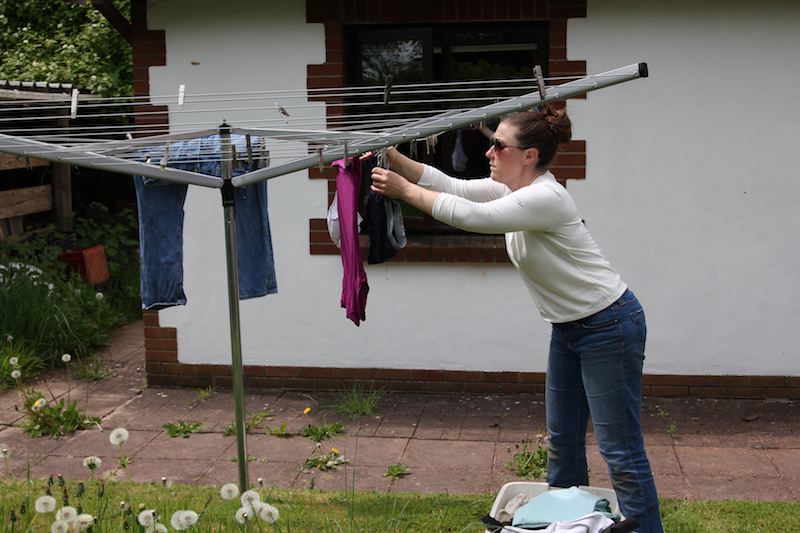
A consistent change Devon and I have had to make on this trip involves our laundry – we don’t use dryers, we use clotheslines.
When we first used one in England we thought it was a bit of an anomaly. We didn’t mind using it, but thought it was kind of a pain in the butt to coordinate our laundry with weather. Then we went to Wales. They too had a clothesline. In fact, every place we’ve visited has had a clothesline. Many don’t even have dryers.
So, what’s up with the states? Why don’t we use clotheslines? I know we used to, so where have all the clothes lines gone? I grew up with a dryer my whole life. You only had a clothesline if you didn’t have the money to buy a dryer. The U.S.’s attitude of quick, easy and unconcerned with environmental impact, I think, is well illustrated with the disappearance of the clothesline.
Recently, for obvious reasons, there’s a lot of talk of energy conservation, alternative energy etc. I think using a clothesline is one of the easiest and quickest ways to make a clear and significant impact. If you live in an area that has sun any time of year, I say use a clothesline.
# 10 on our list of things to have when we go back: clothesline.
Posted: September 1st, 2010 | Author: Halbe | Filed under: Uncategorized | No Comments »
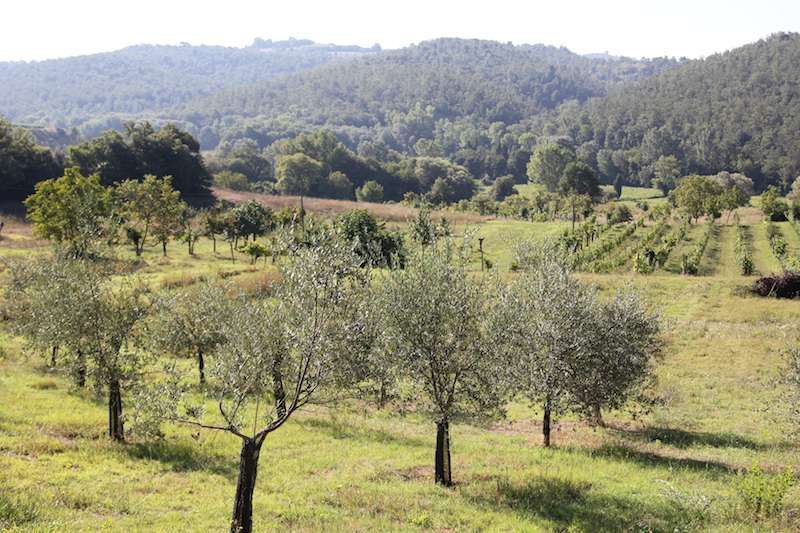
At our last place in Tuscany, we were helping on a smallholding (property with a farm under 50 acres) that had a small vineyard and olive grove. Devon and I worked in the olive grove for a bit and learned a lot about olive trees. The most interesting part was the trimming.
An olive tree would virtually be a bush if it weren’t for a whole lot of pruning and shaping. An olive tree will just grow branches anywhere it can. In fact, if a tree has been frozen due to cold weather, or had appeared to be “dead,” the solution is to cut the tree down to a stump. New branches will grow out of the stump, and voila, the olive tree is back.
Part of the pruning process was to open up the center. Each olive tree should have a dome like center with little to no branches in the middle. To create and maintain this shape, Devon and I were charged with cutting out all the suckers and any branches that were growing straight into the center.
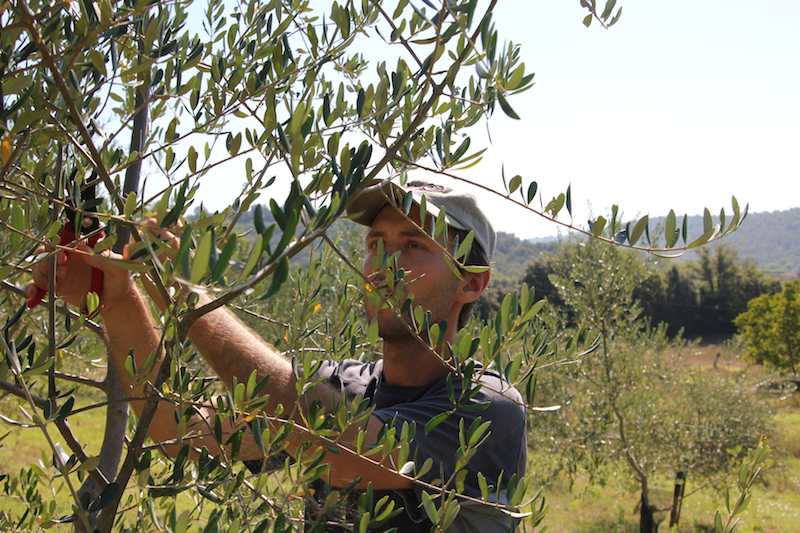
At first, we weren’t sure how to tell if the branch was a sucker. But, eventually, we got the hang of it. The suckers were usually new growth and the bark was lighter than the rest of the tree. Anything growing right into the center should be cut. A branch that looked like it could be coaxed to grow away from the center should be pulled out and guided to point down. In the end, you want a tree with branches primarily pointing down at the ground with a hollow-esque center.
Olive trees take a while to grow, but can also last forever. The trees we pruned were four years old and pretty small. They were just starting to produce olives. To make his olive oil, our host would harvest the olives by hand and then send them to the co-op which creates the oil for him. Financially, it made more sense to have the oil produced by the co-op.
We were able to enjoy his olives and olive oil. I loved both – they tasted so authentic and “fresh,” (which is a strange thing to say about something that’d been sitting in a jar for five years). Devon, however, thought the oil was lovely but the olives were too bitter. We hope to try more olive oil and olives while we’re out here to compare.
Posted: August 9th, 2010 | Author: Devon | Filed under: Uncategorized | 1 Comment »
A photographic narrative in six frames of horror and bravery! Watch! as Devon rids their home of a venomous, winged blight:

Wasps in wait, building their venom/larvae stockpile

They spot us
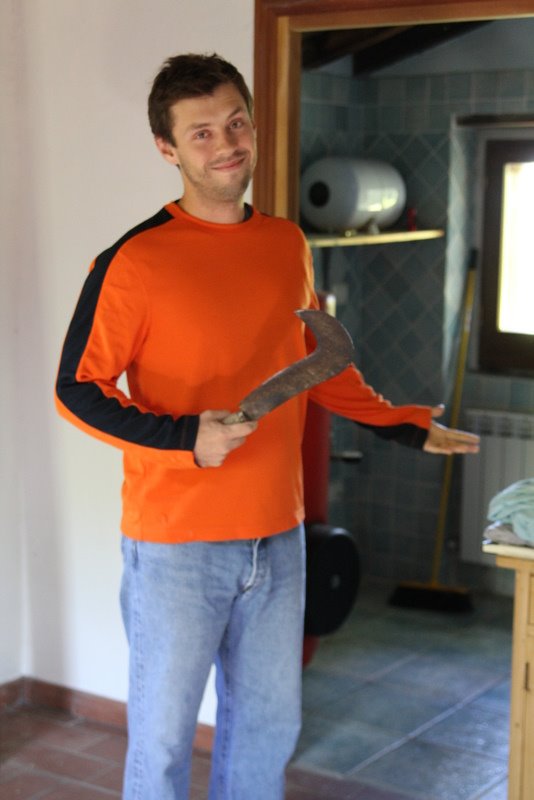
Devon arms himself with the wasps' natural enemy: the machete

Into the proverbial "lion's den"
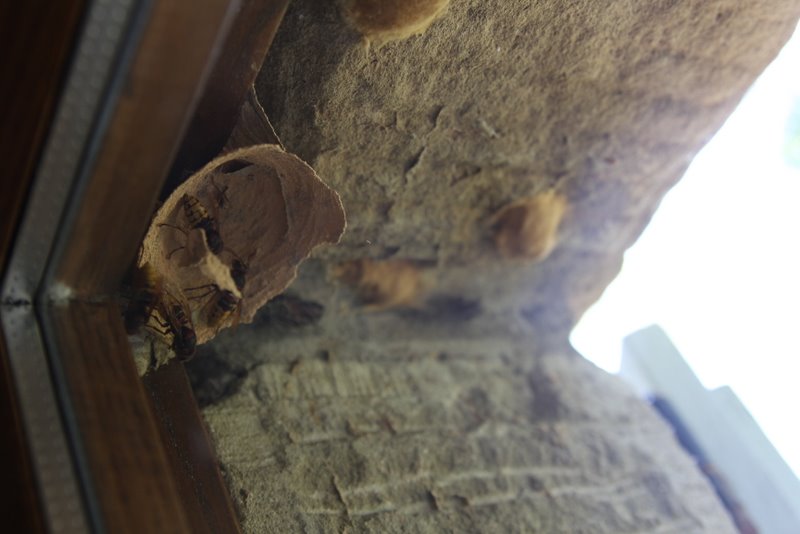
Their home: demolished
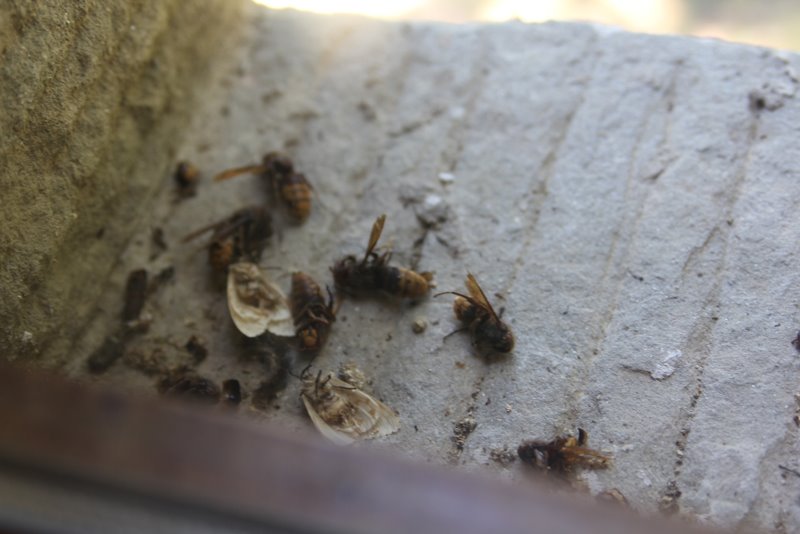
Their threat: eliminated
Posted: July 15th, 2010 | Author: Halbe | Filed under: Uncategorized | 3 Comments »
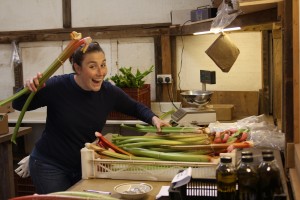
Halbe weighing rhubarb for the box scheme customers in Wales.
On our travels, we’ve heard a few common themes from small producers of organic goods (for ease of writing we’ll call them “farmers”). They don’t like branding and with it, marketing. When Devon and I first heard this at a farm in Wales, we were awe struck. Why wouldn’t they brand their product? If they’re trying to sell what they make, wouldn’t they want as many people to know about them as possible? The answer is a simple, “no.”
At the farm we worked on in Wales, the two owners flat out said they, “didn’t believe in branding.” This coming from two people who live off the income from their farm. They have a box scheme (i.e. they sell boxes of produce to individuals who would pick them up) and went to two farmers markets, weekly. But, they didn’t market their produce beyond that and were even hesitant to use brown paper bags. They feared people might start to associate them with paper bags as a type of branding. This is an extreme example, but many of the farmers we’ve worked with didn’t like branding/marketing either.
We’ve come to a few conclusions as to why this might be. They’re based on direct feedback from the farmers themselves and educated observations we’ve made on our travels. The first is concerned with marketing. They don’t want to work with large grocery stores. Some of the farms we worked with had in fact turned down the opportunity to work with grocery chains (e.g. the farm in Wales). The goat cheese farm we worked at in Cork even severed their partnership with a local chain.
As told by the farmer, the main reason was that they didn’t really make much money working with them. They even lost money. They were selling goats milk – true blue, unpasteurized goats milk. When he first partnered with the store he was thrilled. He’d be able to sell dozens more litres than when he was at the farmers market. Or so he thought. What ended up happening was that he’d give them milk to sell and he’d get money only if the milk sold. In five days time, when the milk expired (it’s very fresh) they’d tell him to pick up what hadn’t sold (which wasn’t much), bring more and they’d even have to decrease the price. So, he’d sold very little milkand it was going to waste. That’s milk he could have used to make cheese which sells for 7 euros/jar.
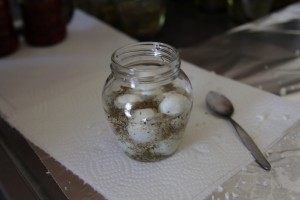
Fresh goat cheese made in Cork - best goat cheese we ever had.
The other reason we thought might play into this is that they prefer to be smaller operations. This way they can control their quality and their work load. They liked being small operations with a few select customers and were perfectly content with the money they made. They loved doing what they did and were pleased just to be making any money from it at all. Expanding was a headache they didn’t want.
What I begin to wonder is what this means for customers who want to eat organic, fresh produce/dairy products but aren’t near a small operation. I understand not wanting to be bigger, but do I need to live in a small town to get fresh eggs, cheese, milk and produce? Not necessarily. There are products at Ralphs that I like, but my point is that it’s not just that the markets don’t work with the farmers, it’s also that the farmers don’t really want to work with the markets.
The issue is complicated and I’m not trying to over-simplify. What I am realizing on this trip is that there are many, many sides to this equation. This one is new to us.
Posted: June 16th, 2010 | Author: Halbe | Filed under: Uncategorized | 5 Comments »
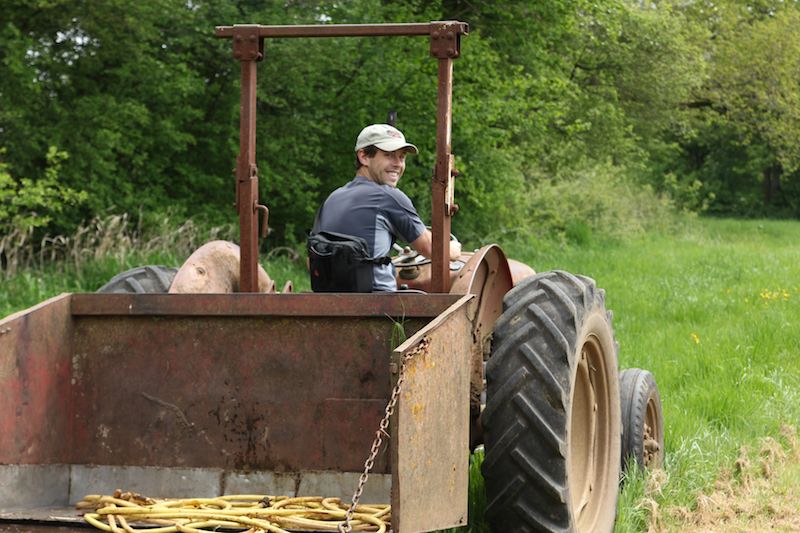
That is all.
Posted: June 14th, 2010 | Author: Devon | Filed under: Uncategorized | 5 Comments »
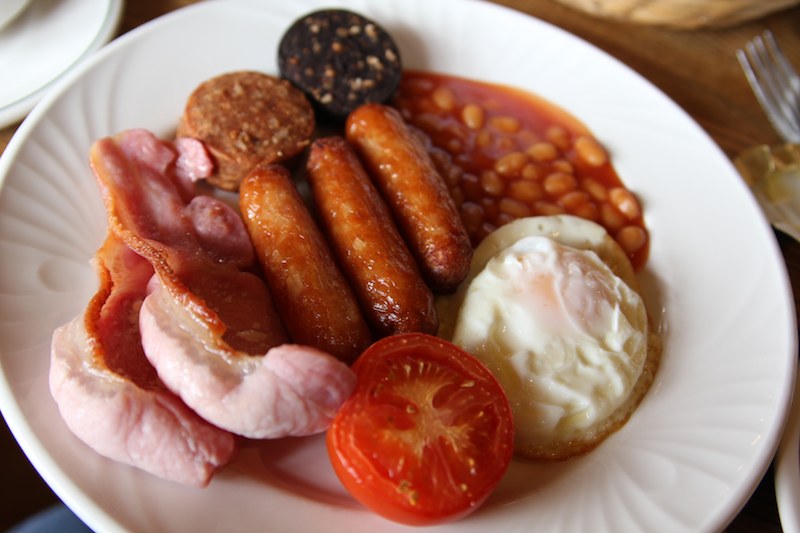
The full Irish breakfast, as served by The Moorings restaurant in Portmagee, County Kerry, Ireland. Egg poached, pork sausage, bacon, fried tomato, baked beans, black pudding and white pudding (both sausages).
We ended up here after the weather ended our hopes of crossing to Skellig Michael. The full Irish breakfast cheered us up (Halbe had porridge). We watched the choppy waves in the port from our window-side seat.
Posted: June 10th, 2010 | Author: Devon | Filed under: Uncategorized | 7 Comments »
And five days left without dependable internet. In in a nutshell, in a bulletted list, here’s what we’re doing:
– Goats: water, hay, straw, milking with machine, clean machine, repeat in the evening.
– Muck out stalls (remove all the old urine and feces-laden straw)
– Walk greyhounds twice a day, clean out their stalls
– Watch our waistline balloon on the solid diet of potatoes and meat (i.e., Tuesday night’s meal (per person): two hamburger patties, two sausage, pork loin, chicken breast, steak, jacket potato with butter, roll with butter)
– Watched greyhound races
– Watched greyhound time trials
– Watched greyhounds exercise on beach
– Go to local pub (Marine Bar) for traditional music
We leave on the 15th for Paris, where we’ll remain for five days.
Posted: June 3rd, 2010 | Author: Devon | Filed under: Uncategorized | 1 Comment »
Halbe and I are alive and well, but with a limited internet connection. I’m literally writing this on a laptop balanced on a fencepost on the edge of a goat field. We’ve been taking tons of photos and enjoying our time on a goat farm in Ireland. We worked at a farmer’s market today, and talked to many of the other vendors about their own experiences. Fascinating stuff which we hope to write about soon.
A few Anglo-Nubians are waiting for their turn, so I need to hop. Updates soon!












